
SALT LAKE CITY — The Utah Legislature wrapped up its business for the year Friday. Lawmakers tackled a number of issues this year during a session that was partially conducted remotely because of the COVID-19 pandemic.

From issues related to COVID-19 to electric cars and the Colorado River to license plates, here’s a look at some of the issues the Legislature addressed this year:
Governor’s emergency powers
A bill that would curtail some of the governor’s emergency powers and allow more input from the Legislature passed the House Friday and moves to the desk of Gov. Spencer Cox for signing.
Authored by Sen. Evan Vickers, R-Cedar City, SB 195 stems from legislator opposition to some of the orders that have come from the governor’s office during the pandemic. Beyond the mask mandate, that has included orders for distancing in restaurants and other limits on businesses and gatherings during the pandemic.
“Nothing in this bill says that the legislature would have overturned anything,” Vickers said, “and in fact, it would create a process where significant expert testimony and public input would be gathered in a committee meeting that would make recommendations back to the whole legislature for action.”
COVID-19

Lawmakers passed HB 294, the so-called COVID-19 “Endgame” bill that establishes a timetable to lift COVID-19 restrictions across the state. The bill was also amended to end the state’s mask mandate by April 10. However, this will not apply for groups of over 50 people unable to socially distance themselves.
Other state restrictions are set to be lifted by July 1 unless certain benchmarks are reached before then.
Transportation
Legislation proposed by Rep. Kay Christofferson, R-Lehi, to increase registration fees on electric and hybrid vehicles as a way to make up for the state’s dwindling gas tax revenue – which is applied to road infrastructure upkeep – passed in the Senate, yet later died in the House.
Lawmakers also proposed a $1.4 billion infrastructure spending bill that funds rail projects in northern Utah, improvements to state parks and road projects across the state in general. Designated HB 433, the bill was originally $2.2 billion until negotiation between the House, Senate and governor’s office knocked off around $1 billion of that due to bonding concerns, according to Fox13News.
Water
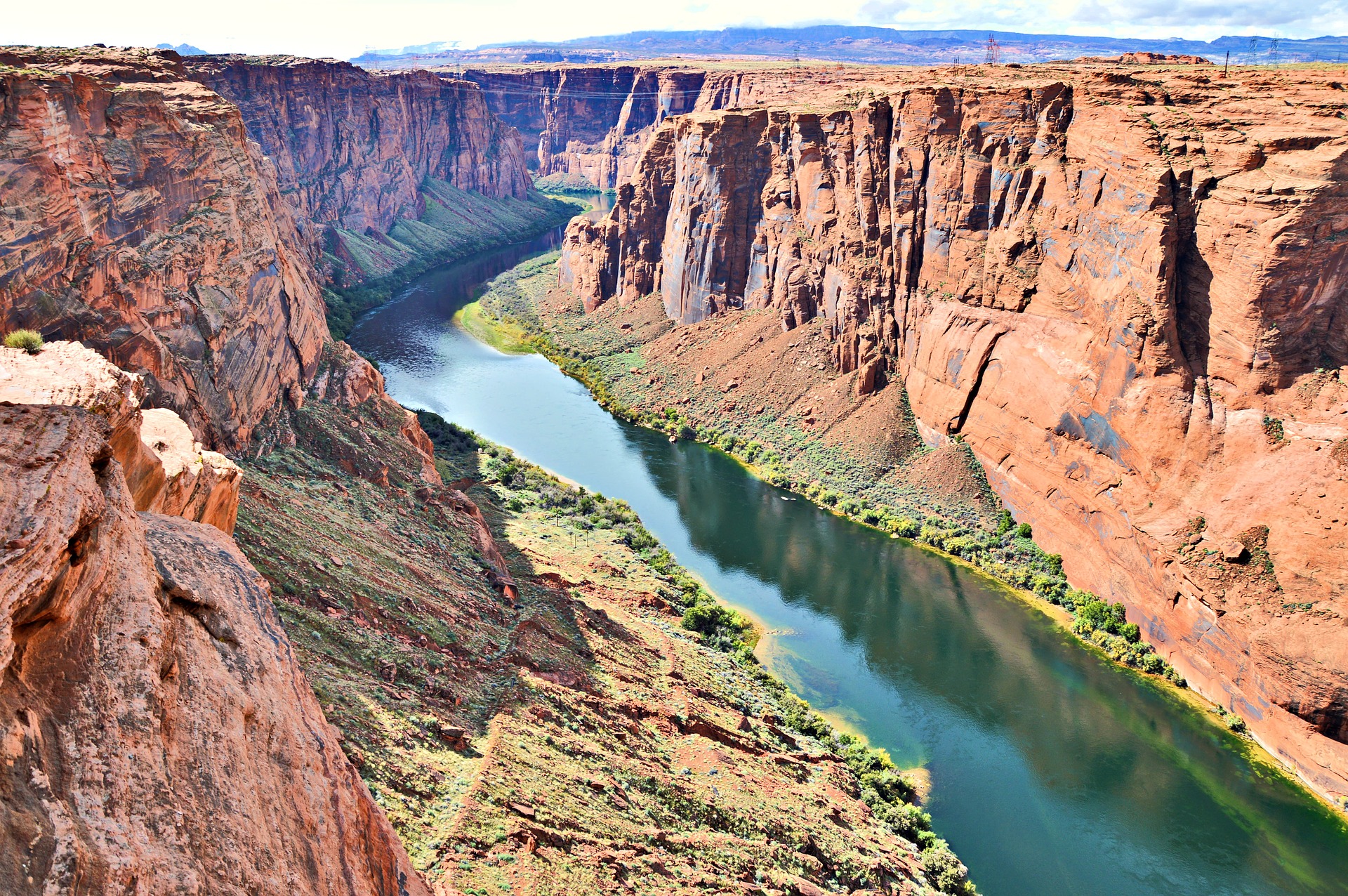
A bill creating the “Colorado River Authority of Utah” saw its final passage in the House and Senate this week and moves to the governor.
The purpose of the bill is to create a body of technical and legal experts who will be able to promote and preserve Utah’s water rights to the Colorado River, as well as the ability to develop infrastructure related to it like the Lake Powell Pipeline.
Other states that Utah shares the Colorado River with already have agencies dedicated to fighting for their ability to access the river. Utah’s having a similar water agency is considered by supporters of the bill as a way to level the playing field.
Firearms
Gun owners no longer need a permit to carry a concealed gun in Utah under a bill by Rep. Walt Brooks, R-St. George. The bill, HB 60, easily passed the GOP-dominated Utah Legislature and was quickly signed into law.
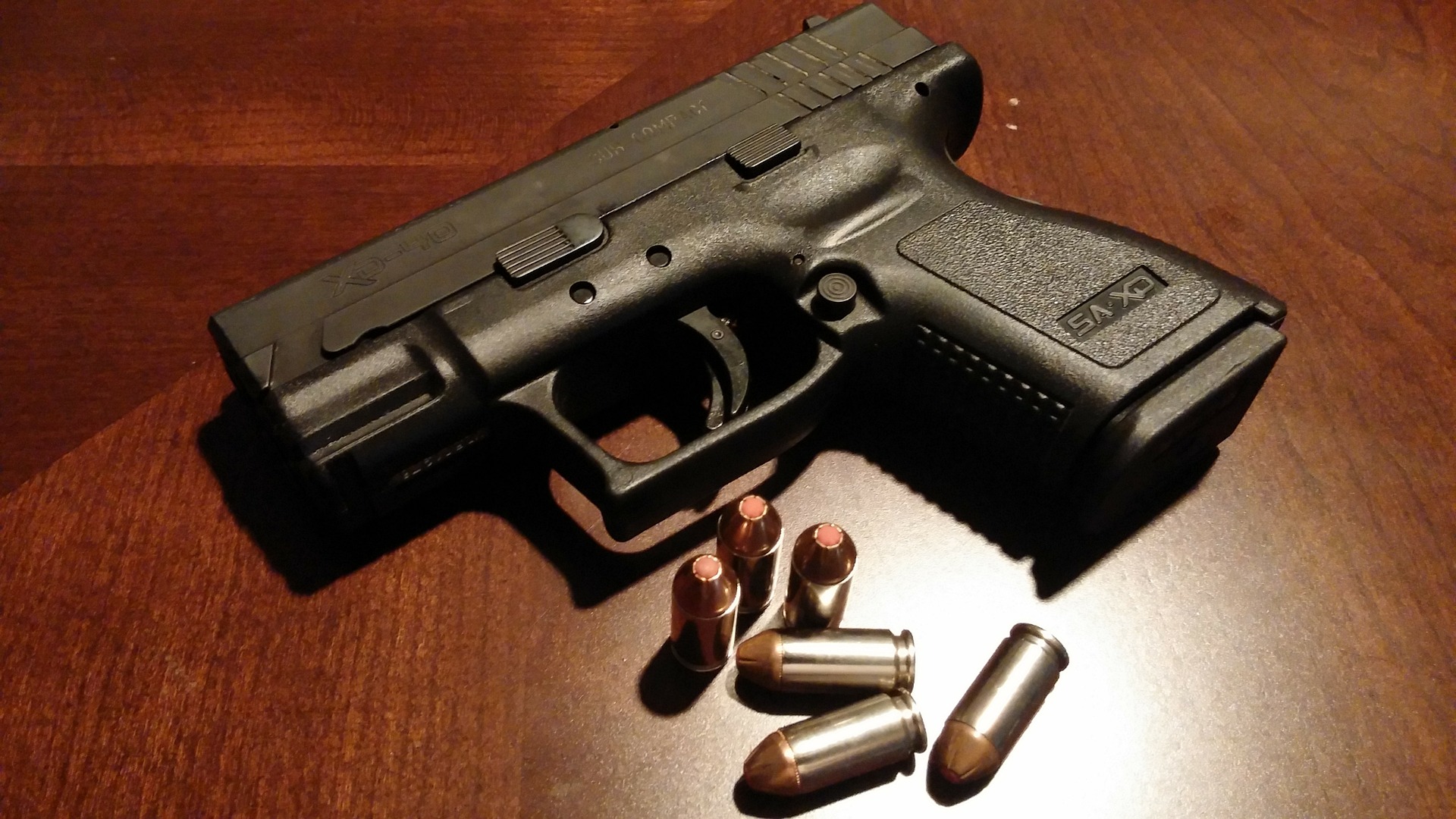
The state had previously required people to take a weapons course, undergo a background check and get a permit to legally carry a gun in public hidden under a jacket or inside a purse. Though Utahns are no longer required to have a permit to carry a concealed firearm, Utah will continue to issue permits due to their reciprocity with several over states.
Utah was at least the 16th state to allow permitless carry, and several other states are considering similar measures backed by gun-rights groups like the National Rifle Association.
HB 258, a bill that would have established a three-year pilot program to teach firearm safety to high school students, cleared the House but never made it onto the Senate floor.
Sponsored by Rep. Rex Shipp, R-Cedar City, the measure would have enabled students in grades 9-12 to receive a semester-hour’s worth of elective credit for passing the gun safety course. HB 258 passed the House in February, but never made it out of committee in the Senate.
State parks and national monuments

The Legislature approved the creation of two new Utah state parks: Utahraptor State Park in the Dalton Wells area roughly 15 miles northwest of Moab, and Lost Creek State Park in Morgan County. The bill appropriates a one-time expenditure of $36,500,000 from the General Fund for the creation of the parks.
Rep. Phil Lyman, R-Blanding, teamed up with Rep. Doug Owens, D-Millcreek, to cosponsor HB 341, Owens’ bill would create a committee to look into the creation of a visitor center for the Bear Ears National Monument, according to Fox 13 News.
The bill, which passed the Senate this week and moves on the governor, has gained attention due to the Republican and Democrat legislators who joined together to push it through. Owens wants to see the monument’s original boundaries restored while Lyman is strongly opposed to the idea. A visitor center is nonetheless considered a potential benefit to the area no matter the form the monument holds in the future.
Native American mascots and names

HCR 3, a concurrent resolution that would have discouraged the use of Native American themed mascots and symbols by K-12 schools, failed to make it through the House. Sponsored by Rep. Elizabeth Weight, D-Salt Lake City, the measure was voted down 45-27 on Feb. 16.
However, Weight, whose alma mater Bountiful High School is currently in the process of changing its longtime Braves mascot, told St. George News she plans to revisit the issue again next year.
A similar bill, run by Sen. Jani Iwamoto, D-Salt Lake City, creates a process for removing names of landmarks that are viewed as offensive to Native Americans. It passed the Legislature in mid-February and awaits signing by the governor.
Shivwits Band of Paiutes Chairwoman Carmen Clark told St. George News that after the bill passed in the Senate and she had a chance to read through it, she was pleased with the language.
“The main thing that pops into my head is respect because of the regard of the feelings, rights or traditions of Natives,” Clark said. “It’s like ending the era of harmful and offensive names.”
License plates
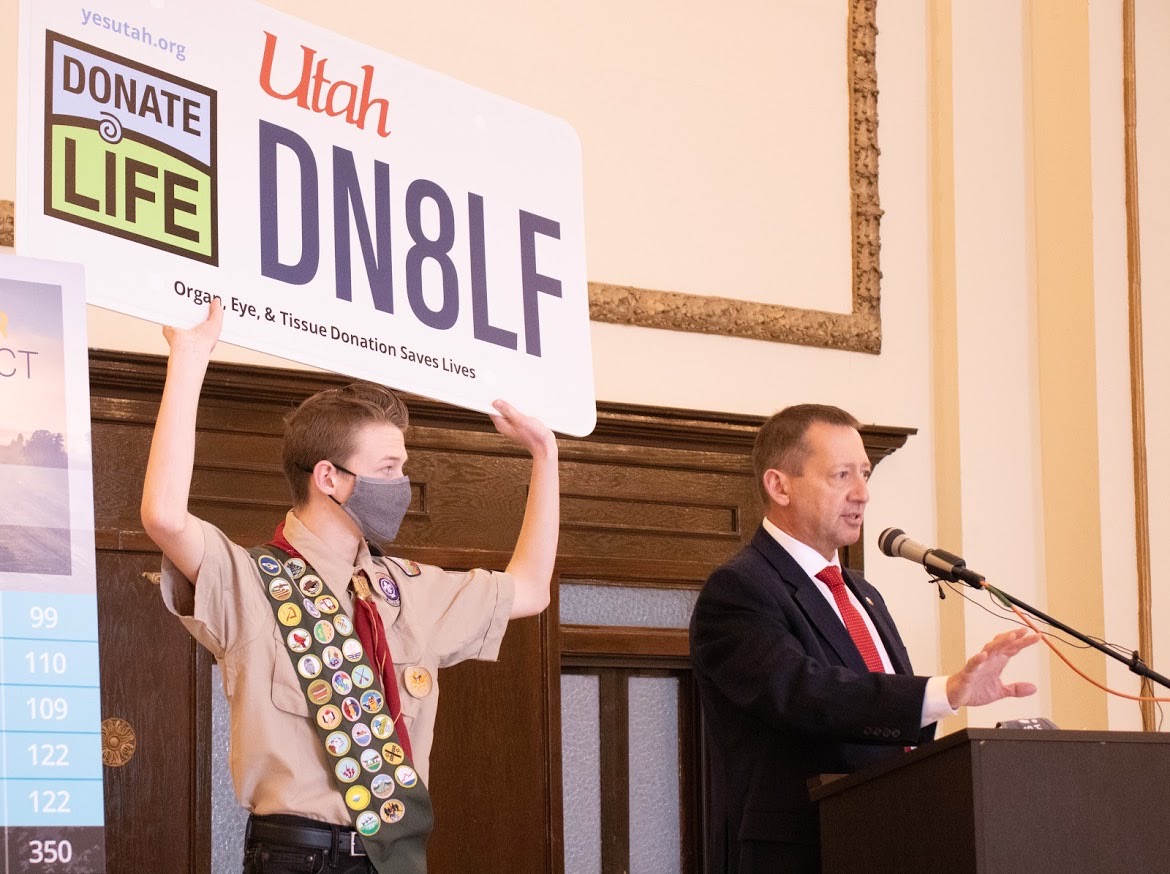
The “Donate Life” special group license plate seeks to support nonprofit organizations dedicated to connecting, registering and advocating for organ donors and donor families., and passed the Legislature Friday night.
The bill was inspired by the late Allyson Gamble, executive director of the Capitol Preservation Board and a two-time heart transplant recipient who died on Dec. 5, 2020. SCR 5, a resolution honoring the life and public service of Gamble, and SB 186, a bill renaming Senate committee room 210 in her memory, were also passed unanimously during the 2021 Legislature.
The “Donate Life” special group license plate seeks to support nonprofit organizations dedicated to connecting, registering and advocating for organ donors and donor families.
A bill sponsored by Rep. Stephen G. Handy, R-Layton, sought to introduce a new standard license plate option, “Utah Dark Sky.” The license plate was designed to recognize the state’s abundance of designated dark sky places, highlighting the importance of preserving night sky views while capitalizing on the rising popularity of astro-tourism.
The bill failed in the House due to concerns over the one-time expenditure of $175,000 from the General Fund during fiscal year 2022 to pay for the design and production of 25,000 license plates.
Transgender youth

A push to ban transgender athletes from girls’ sports teams in Utah passed the state House this session, but it was halted in the Senate after the governor raised doubts.
About two dozen other states are considering similar bills this year. Opponents say they discriminate against an already marginalized group and run counter to an executive order from President Joe Biden. Supporters say transgender athletes can have advantages over other girls and the measures would even the playing field. Officials say there are no transgender athletes playing high school sports in Utah.
A separate bill that would have restricted gender-confirming medical care also died in committee this year.
Dixie State name change
Lawmakers passed a watered-down version of a bill that could change the name of Dixie State University.
The name is considered offensive because it’s associated with the Deep South and slavery. A plan to change it passed the House. But it stalled in the Senate until students from the Southern Utah institution staged a protest at the state Capitol.

HB 278 was one of the more divisive bills on capitol hill during the 2021 legislative session. It passed the House Education Committee with one amendment which was to include that the name of the campus could still be called “Dixie Campus.”
The version of the proposal that passed the Senate on Wednesday would require the name to be reconsidered next year but allow the option of keeping it. Several Republicans voiced concerns that the legislation is a product of “cancel culture” gone too far.
Dixie is a regional nickname for southwest Utah stemming from century-old plans to grow cotton by settlers with The Church of Jesus Christ of Latter-day Saints.
Education
A bill by Sen. Todd D. Weiler, R-Woods Cross, grants eligibility to armed forces veterans residing in Utah to enroll in regularly scheduled college and university classes when surplus space is available. With the exception of a nominal registration fee, classes will be exempt from tuition and other costs. Courses are not matriculated, and the participating veterans will not receive college credit.
The bill passed the House and Senate and moves to the governor’s desk.
The Utah Legislature also approved $475 million in new spending. Lawmakers also passed a bill giving teachers and school staffers $1,500 and $1,000 bonuses respectively as a “thank you” for working through the pandemic.
State flag
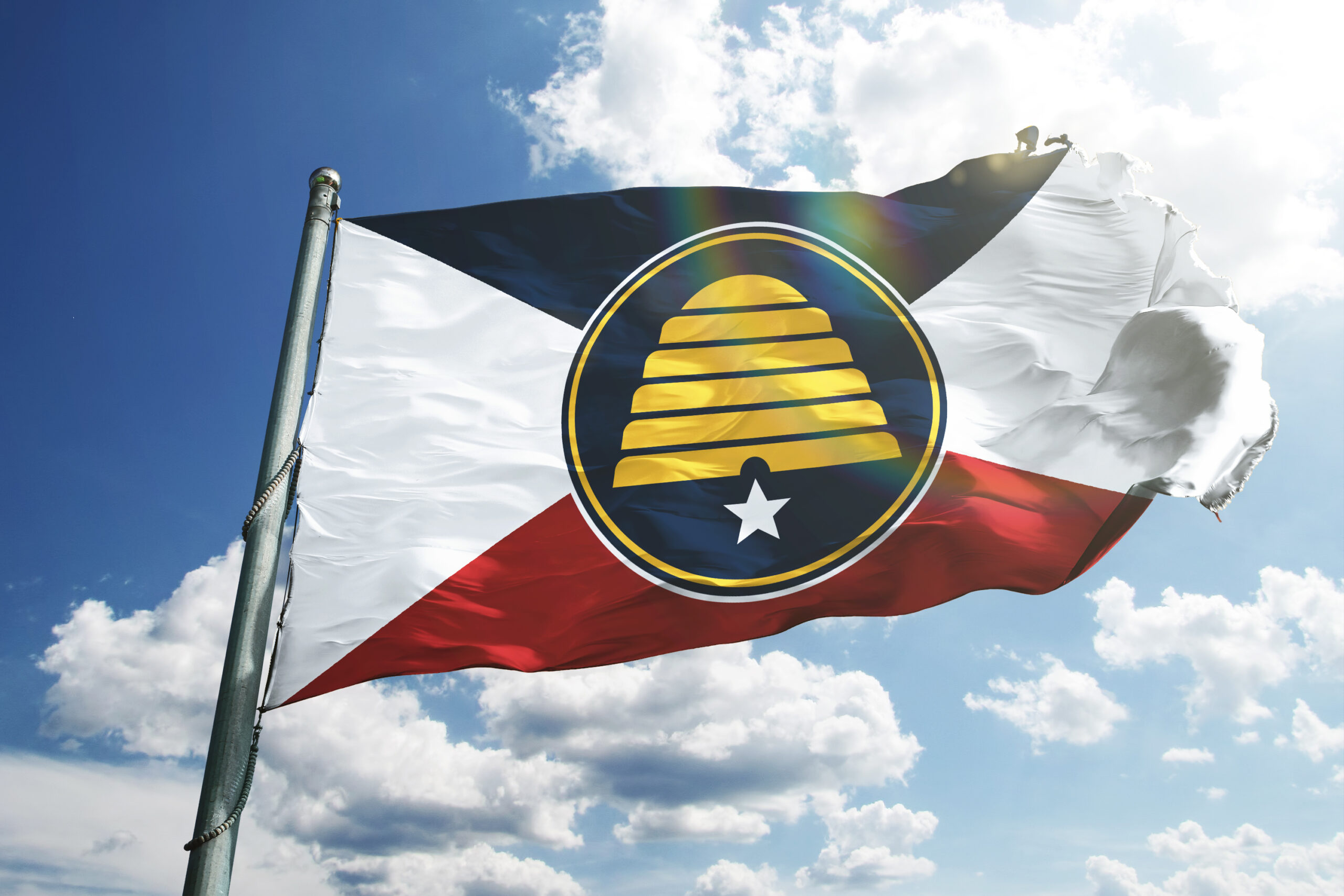
Both the Senate and the House passed SB 48, called “State Flag Amendments,” Thursday.
Sponsored by Sen. Daniel McCay, R-Riverton, the measure designates a commemorative state flag and authorizes it to be flown at state facilities during 2021, the Utah’s 125th anniversary of statehood. The bill establishes a task force to consider whether Utah’s official state flag should be changed, and if so, what it should look like. Public input will be solicited as part of the process.
Stone stone
In the “state symbols” section of the Utah Code, there was just one addition made in 2021. HB 188, sponsored by Rep. Christine Watkins, R-Price, designates honeycomb calcite, a rare form of golden-colored calcite found only in Duchesne County, as the new state stone.
The bill passed the House and the Senate last month.
Tax cuts
The Legislature passed a nearly $100 million package of tax-relief bills involving families with children, veterans and older residents receiving Social Security.

The bills were supported by Republican Senate President Stuart Adams and House Speaker Brad Wilson. They came after new revenue estimates showed that lawmakers had an additional $1.5 billion to spend this year because the economy is improving faster than predictions despite the pandemic.
Most of that money, though, was one-time cash and not available for next year’s budget.
Troubled teens industry
Lawmakers passed rules regulating treatment centers for troubled teens, weeks after Paris Hilton gave emotional testimony in support of the bill.
The legislation for facilities that treat teens with behavioral and mental health issues gained final approval in the House on Tuesday and is headed to Gov. Spencer Cox for consideration.

The proposal would require more government oversight of youth residential treatment centers and documentation for when they use restraints. It would also prohibit treatment centers from using sedation or mechanical restraints without prior authorization.
Hilton testified she was abused mentally and physically at a Utah boarding school, where staff members would beat her, force her to take unknown pills, watch her shower and send her to solitary confinement without clothes as punishment.
Wildlife
Dubbed “Sadie’s Bill,” HB 109 will require the Utah Division of Wildlife Resources to deliver notice to a landowner, either in writing or orally, before the taking of wildlife on privately owned land.
The division may take the wildlife immediately afterward or at a time reasonably required for the taking after delivering notice. However, the notice requirements would not apply in a situation when the wildlife in question poses a threat to public safety or exigent circumstances exist.

The bill, which was passed bhy both houses and is on the governor’s desk, came about due to outcry stemming from a deer being shot by a Utah Division of Wildlife Resources conservation officer on private property in Antimony in January 2020.
Porn filters
New cellphones and tablets sold in Utah would have to come with pornography filters under a proposal passed by the Legislature.
Republican sponsor Susan Pulsipher has said it would be a boon to parents, but critics questioned whether it was workable or constitutional, the Salt Lake Tribune reported.
If signed by the governor, it wouldn’t go into effect unless five other states pass similar laws. Utah has previously declared porn a “public health crisis” and required porn warning labels.
Law, crime and incarceration
The Peace Officer Training Amendments, HB 160, introduced by Rep. Angela Romero, D-Salt Lake City, passed during the general session that concluded Friday.

The bill will increase the 40 hours of training each officer is required to complete annually by including 16 hours of training focused specifically on de-escalation training – a curriculum designed to teach officers specialized skills to slow a situation down and create space when they are confronted with a potentially dangerous situation.
A bill that would prohibit the distribution of mugshots taken during the jail booking process until after the individual is convicted of the crime they were arrested for passed the Senate and will move to the governor’s desk for signature.
The bill amends the Utah code by making a jail booking photo “a protected record” and prohibits disclosure of “an image taken of an individual during the process of booking the individual into jail, unless the individual is convicted of a criminal offense based upon the conduct for which the individual is incarcerated.
The use of facial recognition and other image-capturing technologies has received increased attention from policymakers and the public – including Sen. Daniel Thatcher, R-West Valley City, who introduced SB 34.
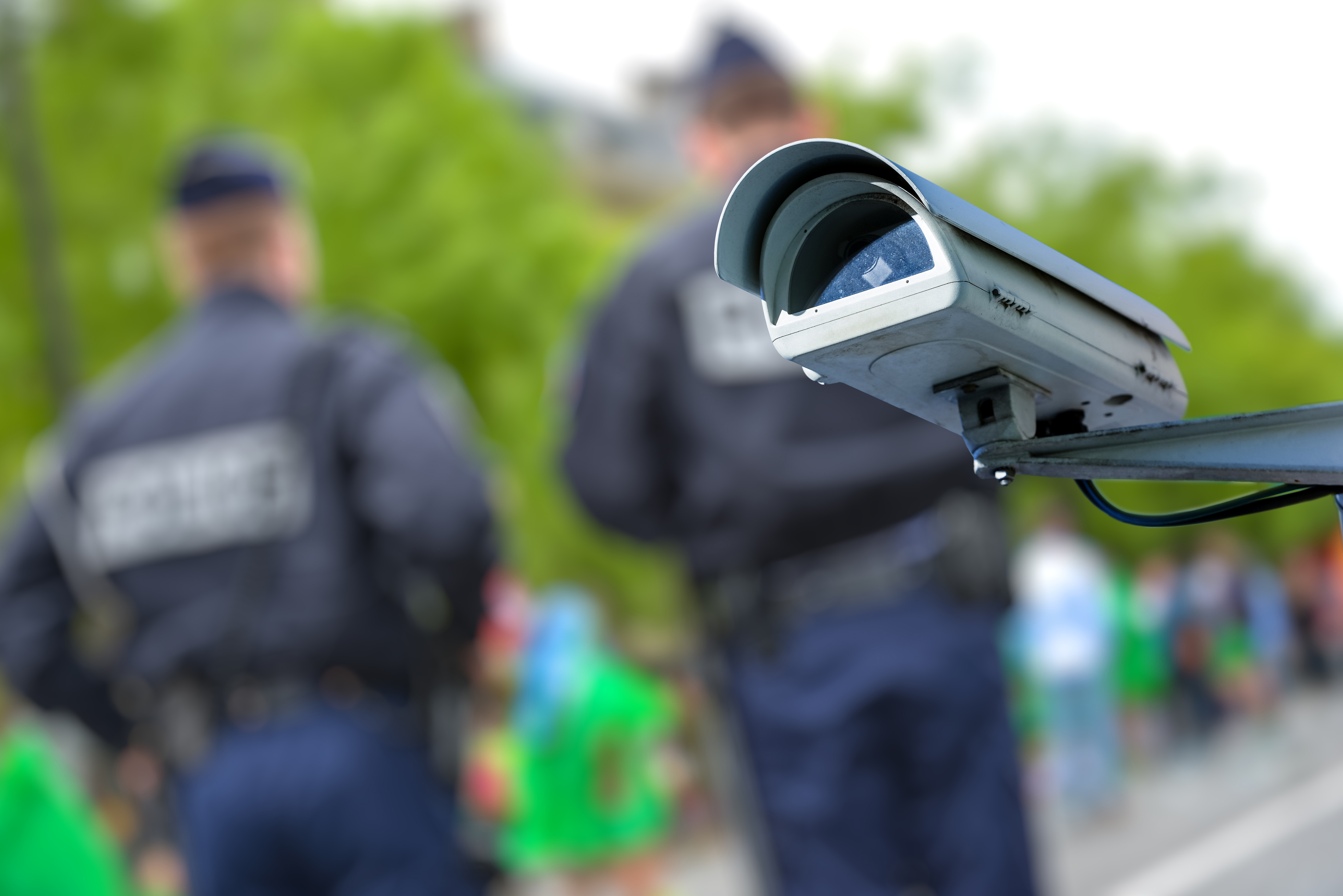
The bill will require law enforcement to submit a written request for a facial recognition comparison that includes a statement of the specific crime they’re investigating and that a factual basis exists to support a “fair probability” the person is connected with the crime and will also prohibit a government entity from using a facial recognition system on an image database.
The bill passed the Legislature and now heads to the governor’s desk.
The Violence, Disorder and Looting Enforcement Protection Act, dubbed SB 138, that was introduced to the 2021 Utah Legislature by Sen. David P. Hinkins died in the House Rules Committee where it has sat since Tuesday.
The bill would have allowed bail to be denied for people accused of rioting who are arrested for an offense committed during a riot, particularly in cases where there has been “substantial property damage or bodily injury is sustained.”
Moreover, the bill would also protect a driver from legal liability who unintentionally causes injury or death to a protester if at the time they are fleeing from a riot under a “reasonable” belief that fleeing is necessary to protect driver and any passengers from serious injury or death and allow property owners to sue a local government entity for damages if the local government fails to protect private property. thus removing the waiver of immunity which protected local governments from being held liable.
The House and Senate also unanimously passed HB 95 from Rep Angela Romero, which brings Utah state prisons into compliance with the Prison Rape Elimination Act of 2003. Utah and Arkansas were the only two states in the U.S. that refused to participate in the federal program created to curb prison rape.
Juvenile justice reform

HB 279, sponsored by Rep. Lowry Snow, D-St. George, is aimed at providing higher education opportunities to incarcerated youth, passed by the House and Senate.
HB 67, a bill that will amend a loophole in juvenile sentencing law was motivated in part by the 2016 killing of a West Valley City Police officer, was sponsored by Rep. Craig Hall, R-West Valley City, and co-sponsored by Snow. The bill unanimously passed both the House and Senate.
Sponsored by Sen. Daniel Thatcher, R-West Valley City, SB 50 was spurred by the story of a woman who was charged as an adult for a sexual offense she committed when she was 14 years old, but the complaint against the woman was not made until she was an adult.
Out of 75 voters, Southern Utah lawmaker Phil Lyman, R-Blanding, was the sole representative to vote against the Juvenile Offender Penalty Amendments legislation. The bill went on the pass in the Senate.
Youth suicide prevention

A bill sponsored by Rep, Brad King, R-Salt Lake City, HB 93 provides increased resources for youth suicide prevention programs. The bill passed the Legislature earlier this week.
“The incidence of suicide in our state among our young people is alarming,” St. George Rep. Lowry Snow told St. George News. “I voted in favor of this bill because it provides additional resources for our children in this area and will assist parents and families working with our schools to help prevent more of the young people suicide tragedies from occurring in our community.”
Distracted driving
The third time was not the charm for a bill introduced to enhance public safety by reducing the risks associated with distracted driving via cell phone use, Distracted Driver Amendments dubbed HB 160, which never moved out of the House Rules Committee since it was sent over by the Senate Feb. 23.
St. George reporters Alexa Morgan, Rich Allen, Morgan Webster, David Dudley, Jeff Richards and Chris Reed, as well as the Associated Press, contributed to this article.
For a complete list of contacts for Southern Utah representatives and senators, click here.
Check out all of St. George News’ coverage of the 2021 Utah Legislature here.
Copyright St. George News, SaintGeorgeUtah.com LLC, 2021, all rights reserved.
Health - Latest - Google News
March 07, 2021 at 01:13AM
https://ift.tt/2PGXTEX
From ending the state's mask mandate to the Dixie State name: Highlights from the 2021 Utah Legislature - St George News
Health - Latest - Google News
https://ift.tt/2zrj9Ud
Bagikan Berita Ini
















0 Response to "From ending the state's mask mandate to the Dixie State name: Highlights from the 2021 Utah Legislature - St George News"
Post a Comment